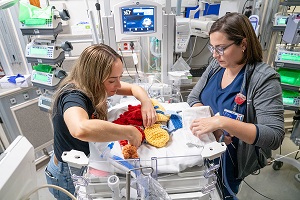Breastfeeding Class In-person- Detroit (Ready, Set, BABY)
Ready, Set, BABY This 2 hour in-person interactive breastfeeding class provides women and their partners with information and skills about...
Henry Ford Health was one of Michigan’s first programs to provide stem cell transplant and other types of cellular therapy. Since 1988, we’ve offered lifesaving care, helping people with cancers or blood disorders produce healthy blood cells and fight disease.
Our team performs complex stem cell transplants for patients from throughout Michigan and beyond. We continue to shape the future of care through ongoing research and innovation.
When you come to Henry Ford for a stem cell transplant or cellular therapy, you benefit from:
Henry Ford is among only a few medical centers in Michigan offering chimeric antigen receptor (CAR) T-cell therapy for eligible patients. CAR T-cell therapy is a groundbreaking immunotherapy treatment that uses modified cells from your immune system to fight cancer.
Our team has the specialized training and experience to conduct CAR T-cell therapy for:
Many patients only need CAR T-cell therapy once. The modified T cells may remain in the body for months, resulting in long-term cancer remission.
Ready, Set, BABY This 2 hour in-person interactive breastfeeding class provides women and their partners with information and skills about...


The Detroit-based health system will celebrate the official construction launch of its historic flagship hospital expansion project with a full day of events


Henry Ford Health’s Trauma Recovery Center aims to help survivors recover from the emotional wounds of violent crime and other sudden injury.

Donating your kidney is a procedure that has become increasingly safer due to advancements in medicine, improved surgical techniques and a highly sophisticated donor selection process.

Typically, advanced liver disease occurs in older people. But recently, young people have been developing advanced liver disease due to alcohol consumption. Learn more about this sobering fact--and how much alcohol is considered 'safe.'

If you have diabetes, you’re at high risk of fatty liver disease. Learn what it is and how you can help prevent it.
We use cookies to improve your website experience. By using this site, you agree to our Terms of Use. Read our Internet Privacy Statement to learn what information we collect and how we use it.